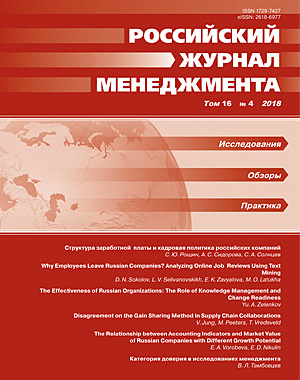The Relationship between Accounting Indicators and Market Value of Russian Companies with Different Growth Potential
DOI:
https://doi.org/10.21638/spbu18.2018.405Аннотация
The paper investigates relationship between accounting and market indicators of Russian companies. The goal of the paper is to test the hypothesis that the power of companies’ book value and earnings in explaining market value varies across Russian firms with different growth potential. Empirical study was carried out on the basis of 41 Russian traded companies that provided financial reports in accordance with international financial reporting standards (IFRS) for 2007–2013. These companies were divided into three groups using price-to-earnings indicator: with high, medium and low growth potential. The linear regression model based on the Ohlson’s theoretical model was tested both on the whole sample of companies and on each subsample, the latter constituting a piece-wise linear function (growthbased model, GBM). The results of the tests show that GBM shows better accuracy in predicting companies’ market capitalization than basic linear model. This result contributes to the stream of literature on non-linear equity valuation and provides insights for valuing Russian companies.
Ключевые слова:
market capitalization, book value, earnings, valuation, growth potential
Скачивания
Библиографические ссылки
REFERENCES
Загрузки
Опубликован
Как цитировать
Выпуск
Раздел
Лицензия
Статьи журнала «Российский журнал менеджмента» находятся в открытом доступе и распространяются в соответствии с условиями Лицензионного Договора с Санкт-Петербургским государственным университетом, который бесплатно предоставляет авторам неограниченное распространение и самостоятельное архивирование.





